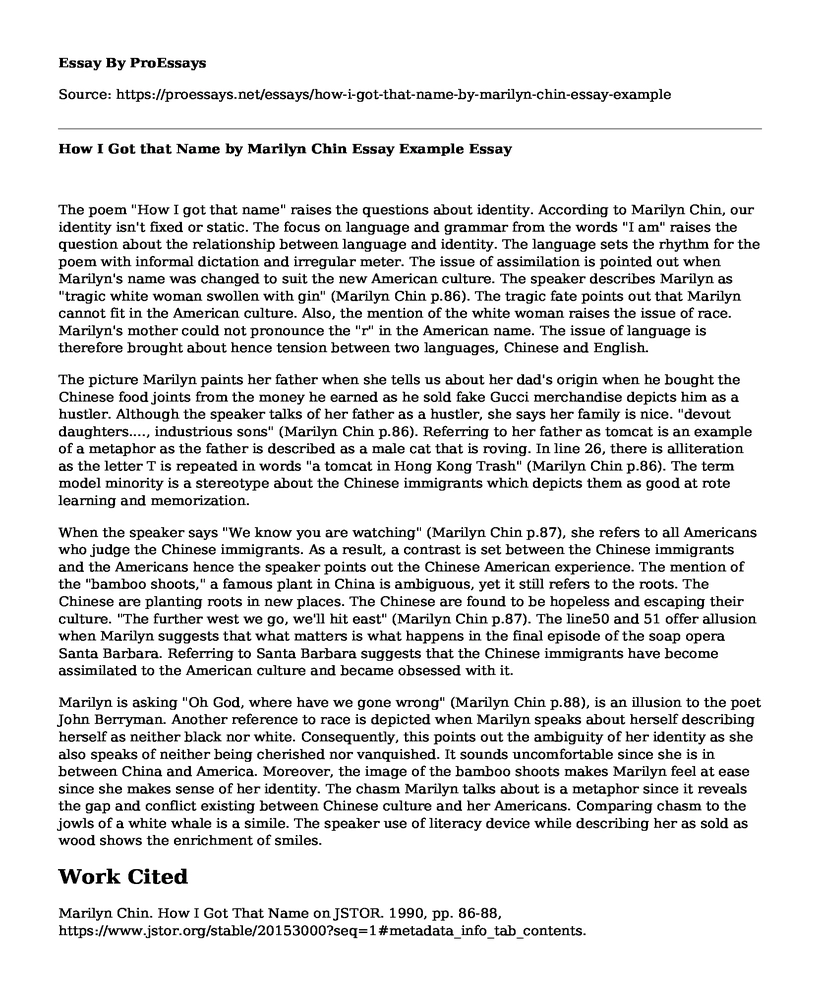The poem "How I got that name" raises the questions about identity. According to Marilyn Chin, our identity isn't fixed or static. The focus on language and grammar from the words "I am" raises the question about the relationship between language and identity. The language sets the rhythm for the poem with informal dictation and irregular meter. The issue of assimilation is pointed out when Marilyn's name was changed to suit the new American culture. The speaker describes Marilyn as "tragic white woman swollen with gin" (Marilyn Chin p.86). The tragic fate points out that Marilyn cannot fit in the American culture. Also, the mention of the white woman raises the issue of race. Marilyn's mother could not pronounce the "r" in the American name. The issue of language is therefore brought about hence tension between two languages, Chinese and English.
The picture Marilyn paints her father when she tells us about her dad's origin when he bought the Chinese food joints from the money he earned as he sold fake Gucci merchandise depicts him as a hustler. Although the speaker talks of her father as a hustler, she says her family is nice. "devout daughters...., industrious sons" (Marilyn Chin p.86). Referring to her father as tomcat is an example of a metaphor as the father is described as a male cat that is roving. In line 26, there is alliteration as the letter T is repeated in words "a tomcat in Hong Kong Trash" (Marilyn Chin p.86). The term model minority is a stereotype about the Chinese immigrants which depicts them as good at rote learning and memorization.
When the speaker says "We know you are watching" (Marilyn Chin p.87), she refers to all Americans who judge the Chinese immigrants. As a result, a contrast is set between the Chinese immigrants and the Americans hence the speaker points out the Chinese American experience. The mention of the "bamboo shoots," a famous plant in China is ambiguous, yet it still refers to the roots. The Chinese are planting roots in new places. The Chinese are found to be hopeless and escaping their culture. "The further west we go, we'll hit east" (Marilyn Chin p.87). The line50 and 51 offer allusion when Marilyn suggests that what matters is what happens in the final episode of the soap opera Santa Barbara. Referring to Santa Barbara suggests that the Chinese immigrants have become assimilated to the American culture and became obsessed with it.
Marilyn is asking "Oh God, where have we gone wrong" (Marilyn Chin p.88), is an illusion to the poet John Berryman. Another reference to race is depicted when Marilyn speaks about herself describing herself as neither black nor white. Consequently, this points out the ambiguity of her identity as she also speaks of neither being cherished nor vanquished. It sounds uncomfortable since she is in between China and America. Moreover, the image of the bamboo shoots makes Marilyn feel at ease since she makes sense of her identity. The chasm Marilyn talks about is a metaphor since it reveals the gap and conflict existing between Chinese culture and her Americans. Comparing chasm to the jowls of a white whale is a simile. The speaker use of literacy device while describing her as sold as wood shows the enrichment of smiles.
Work Cited
Marilyn Chin. How I Got That Name on JSTOR. 1990, pp. 86-88, https://www.jstor.org/stable/20153000?seq=1#metadata_info_tab_contents.
Cite this page
How I Got that Name by Marilyn Chin Essay Example. (2022, Oct 20). Retrieved from https://proessays.net/essays/how-i-got-that-name-by-marilyn-chin-essay-example
If you are the original author of this essay and no longer wish to have it published on the ProEssays website, please click below to request its removal:
- Atticus Finch Character Analysis in To Kill a Mockingbird - Essay Sample
- Critical Essay on Theme of Conflict in Hamlet
- Structural Analysis of Hamlet: Critical Essay
- Research Paper on Shakespeare's Social Roles: Exploring His Literary Legacy
- Essay Example on Dandelion Wine: Life, Death & Joy of Mortality
- Essay Example on Gun Control: Divided Opinions in American Society
- Book Review Example on The Beast in the Jungle: A Tale of Love and Regret







